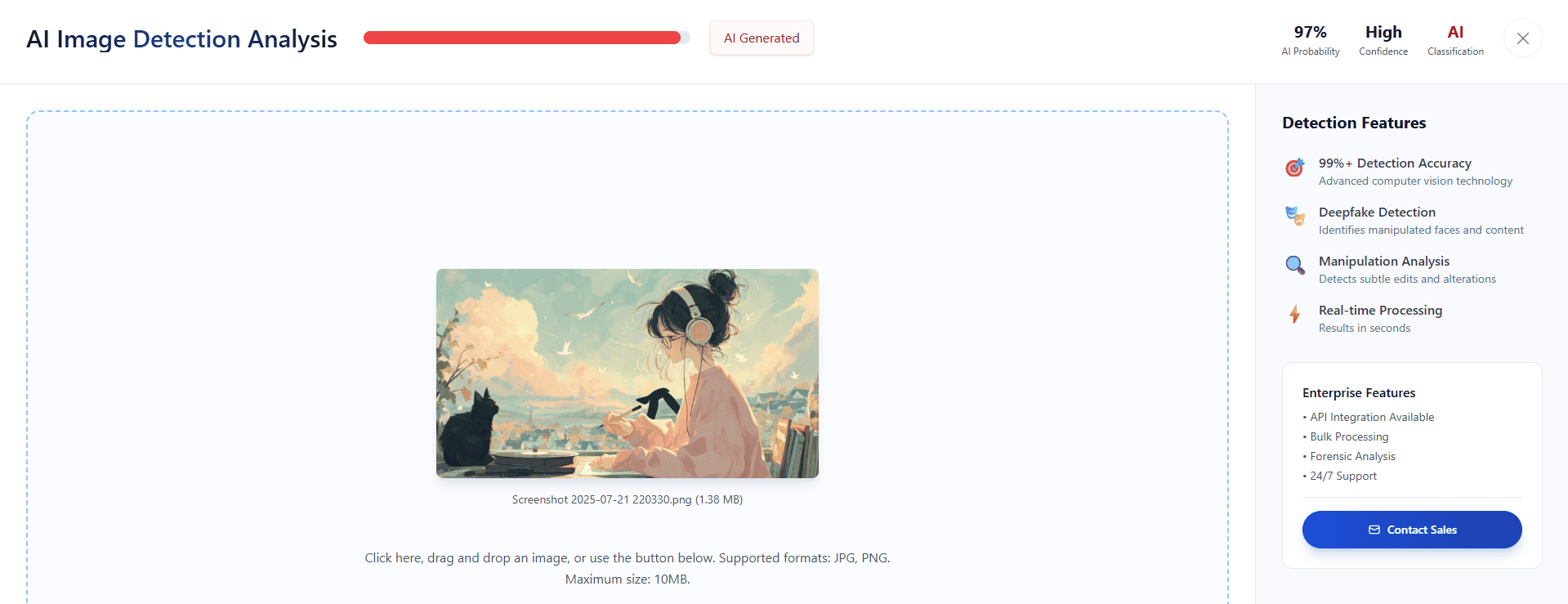TruthScan AI Image Detector Review (2026)
Deepfakes? AI-generated image on your feed? Truthscan claims to be your #1 shield against digital fakery. But does it actually work?
John Angelo Yap
Updated February 14, 2026
The AI Detective, generated by GPT
Reading Time: 4 minutes
Let’s be honest: we’re deep into the new phase of visual fakery. What started as novelty AI art has evolved into hyper-realistic synthetic media—AI-generated images, deepfakes, and subtly manipulated visuals that are now polished enough to slip past even careful viewers.
In 2026, the line between real and synthetic isn’t just blurry — it’s algorithmically engineered to disappear.
If you’re in a field where image authenticity truly matters—news, law, education, cybersecurity—you don’t get the luxury of guessing whether something has been AI-touched.
Enter: TruthScan.
This platform positions itself as an enterprise-grade AI image detection system, promising ultra-fast analysis, high accuracy, and tooling that goes beyond a simple binary verdict of “AI or not.”
But in a landscape where both generative models and detection systems are evolving monthly, does it actually hold up? Let’s break down what it offers — and whether it’s still worth paying attention to today.
What Is TruthScan?
TruthScan bills itself as a comprehensive AI detection suite, with six different tools packed into one platform. For this review, we’re focusing on its AI Image Detector.

What makes this one stand out is the promise of 99%+ detection accuracy, sub-2-second processing times, and support for 50+ file formats, including common ones like JPG and PNG, plus video files like MP4.
Essentially, it's not just for identifying whether an image is AI-generated — it’s built for bulk, high-speed analysis at scale.
That means if you’re a newsroom, a government agency, or a brand trying to avoid public embarrassment, this is meant to work with the volume and speed you need.
What Features Does the Image Detector Offer?
TruthScan splits its image detection into multiple verticals, each of which is relevant depending on your industry or risk profile. Here’s the quick breakdown:

1. AI-Generated Image Detection
This is the bread-and-butter tool. It looks at visuals made by tools like DALL·E, Midjourney, Stable Diffusion, and other diffusion-based models. It flags them based on patterns that humans wouldn’t typically notice—texture inconsistencies, overly smooth gradients, and metadata artifacts.
2. Advanced Deepfake Detection
This is aimed at video content or stills pulled from AI-modified video, where face-swapping and expression synthesis come into play. TruthScan says it uses neural network analysis and facial manipulation detection to identify deepfakes—even the subtle ones.
3. Image Manipulation Analysis
This goes beyond AI generation and into the Photoshop zone. Think background swaps, object removals, lighting edits—TruthScan reportedly flags all of that using forensic-level image inspection. So even if an image wasn’t made by AI, but was sneakily edited to mislead, it still has a chance of getting caught.
Who's It For?
This tool isn’t necessarily for everyday creators or casual Twitter detectives. TruthScan’s product design, language, and integration support clearly position it for:
- Media companies fact-checking submissions
- Government agencies monitoring image-based misinformation
- Education institutions validating student-submitted visuals
- Large brands avoiding AI-generated PR nightmares
In short: it’s professional-grade. If you're just trying to figure out if the dog photo your cousin sent you is AI or not, this might be overkill.
So, Does Truthscan’s AI Detector Work?
Test #1
Truthscan: Correctly classified image as AI-generated.
AI Likelihood Score: 97%

Test #2
Truthscan: Correctly classified image as AI-generated.
AI Likelihood Score: 97%

Test #3
Truthscan: Correctly classified image as AI-generated.
AI Likelihood Score: 79%

Overall Score
Test Number | Truthscan |
#1 | 97% |
#2 | 97% |
#3 | 79% |
Score | 93% |
The Bottom Line
TruthScan’s AI Image Detector feels like a more mature iteration of what most image detection tools are trying to become.
Free browser-based checkers still exist, but in 2026 they’re largely surface-level: slow, limited, and often built for curiosity rather than accountability. TruthScan, by contrast, is clearly designed for teams that need detection workflows to function reliably at scale.
It’s ahead of most free tools in both speed and operational depth. Its strongest advantages remain bulk AI detection, API integration, and newsroom-scale throughput. Where it struggles — like most detectors right now — is in identifying extremely subtle Photoshop edits or borderline hybrid compositions that blend human and AI work.
And that’s important context: detection is still an arms race. As generative models improve, detection systems are forced to recalibrate just as quickly.
Like all detectors, it’s not perfect — AI is evolving fast, and detection is an arms race. But if you need a high-speed, professional-grade detection system with API and multi-format support, TruthScan is one of the stronger paid options right now.
TruthScan is a solid name to keep on your radar.
Want to Learn Even More?
If you enjoyed this article, subscribe to our free newsletter where we share tips & tricks on how to use tech & AI to grow and optimize your business, career, and life.